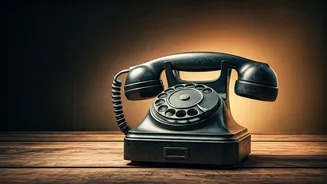Defining Telephobia
Telephobia is characterized by significant anxiety related to phone calls, manifesting physically (e.g., increased heart rate, sweating) and psychologically
(e.g., worry, avoidance). It is not merely a dislike of phone calls; it's a specific phobia, meaning the fear is excessive and interferes with daily life. People with telephobia may dread the sound of the phone ringing, screen calls, or avoid making calls altogether. The anxiety can stem from various sources, including fear of judgment, social awkwardness, or a preference for written communication, which allows more time for thoughtful responses. Understanding the specifics of this phobia is the first step towards managing it.
Causes of Anxiety
Several factors contribute to the rise of telephobia. Social anxiety plays a significant role, as phone calls can involve impromptu conversations and the pressure of immediate responses, which may be perceived as being very stressful. The lack of visual cues in phone conversations can heighten this anxiety, making it harder to gauge social dynamics and intentions. Moreover, the shift towards digital communication, such as texting and emailing, has created a preference for asynchronous communication. This allows individuals more time to process information and craft their responses. For many, the instantaneous nature of phone calls feels overwhelming and intrusive, intensifying the risk of anxiety. Experiences with past negative phone interactions can also contribute, causing individuals to associate the activity with negative emotions.
Recognizing Symptoms
The symptoms of telephobia can vary, encompassing both physical and emotional manifestations. Physically, individuals might experience a rapid heart rate, sweating, trembling, or stomach upset before, during, or after phone calls. Emotionally, signs may include overwhelming anxiety, dread, panic, and a strong urge to avoid answering or making calls. Some people with telephobia may screen calls or let the phone go to voicemail to avoid direct contact. In severe cases, the phobia can significantly affect a person’s quality of life, leading to isolation or missed opportunities. Recognizing these symptoms is important, because this is how you will start to approach the process of managing the phobia and seeking help if needed.
Coping Strategies
Several strategies can help manage telephobia. Cognitive-behavioral therapy (CBT) is an effective approach, as it helps individuals identify and challenge negative thoughts and behaviors associated with phone calls. Gradually exposing oneself to phone calls, starting with less stressful situations and working towards more difficult ones, can help desensitize the fear. Some people find it useful to prepare what they want to say before making a call and practicing the conversation. Using a headset or speakerphone can also reduce anxiety. Deep breathing exercises and mindfulness techniques can help manage physical symptoms of anxiety. If the phobia is severe, professional help from a therapist or counselor is essential.
Seeking Professional Help
For those struggling with severe telephobia, professional help is often necessary. Therapists specializing in anxiety disorders can provide evidence-based treatments, such as CBT and exposure therapy, which help modify thoughts and behaviors associated with phone calls. They can also teach coping mechanisms, such as relaxation techniques, to manage physical symptoms of anxiety. In some cases, medication might be prescribed to help manage anxiety symptoms. The treatment plan is customized to the individual's needs and the severity of their phobia. Seeking professional help is a proactive step toward improving quality of life and overcoming the challenges associated with telephobia. Consulting a mental health professional can provide valuable support and guidance throughout the process of overcoming this phobia.





















